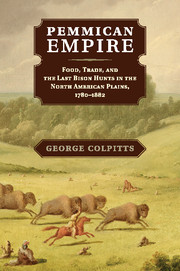Crossref Citations
This Book has been
cited by the following publications. This list is generated based on data provided by Crossref.
Jones, Christopher
2016.
Petromyopia: Oil and the Energy Humanities.
Humanities,
Vol. 5,
Issue. 2,
p.
36.
Colpitts, George
2017.
Knowing nature in the business records of the Hudson’s Bay Company, 1670–1840.
Business History,
Vol. 59,
Issue. 7,
p.
1054.
Hogue, Michel
2020.
Still hiding in plain sight?: Historiography and Métis archival memory.
History Compass,
Vol. 18,
Issue. 7,
Erickson, Bruce
2020.
Anthropocene futures: Linking colonialism and environmentalism in an age of crisis.
Environment and Planning D: Society and Space,
Vol. 38,
Issue. 1,
p.
111.
Campbell, Claire
2022.
The Construction of Canadian Identity from Abroad.
p.
47.
Panas, Timothy
2022.
Northern plains late precontact and historic period winter sand dune usage by bison and human populations.
Plains Anthropologist,
Vol. 67,
Issue. 263,
p.
266.
Pigeon, Émilie
and
Podruchny, Carolyn
2022.
Bannock Diplomacy: How Métis Women Fought Battles and Made Peace in North Dakota, 1850s–1870s.
Ethnohistory,
Vol. 69,
Issue. 1,
p.
29.
Geloso, Vincent
and
Rouanet, Louis
2023.
Ethnogenesis and statelessness.
European Journal of Law and Economics,
Vol. 55,
Issue. 3,
p.
377.





